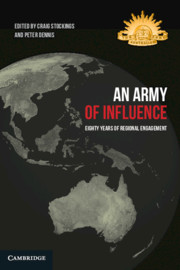Book contents
- An Army of Influence
- Acknowledgement of Country
- An Army of Influence
- Copyright page
- Foreword
- Contents
- Figures, maps and tables
- Contributors
- Abbreviations
- Introduction
- Part 1 The concept of an army’s influence abroad
- Part 2 Lessons from past relationships
- Chapter 4 General Blamey and the Backroom Boys
- Chapter 5 ‘Not rich in standing armies or immediately available resources’
- Chapter 6 Helping the Americans help the Vietnamese?
- Chapter 7 East Timor and the crisis of 1999
- Chapter 8 Onward and onya
- Part 3 Ongoing relationships
- Index
Chapter 7 - East Timor and the crisis of 1999
A case study on the limitations of relationships
from Part 2 - Lessons from past relationships
Published online by Cambridge University Press: 16 November 2021
- An Army of Influence
- Acknowledgement of Country
- An Army of Influence
- Copyright page
- Foreword
- Contents
- Figures, maps and tables
- Contributors
- Abbreviations
- Introduction
- Part 1 The concept of an army’s influence abroad
- Part 2 Lessons from past relationships
- Chapter 4 General Blamey and the Backroom Boys
- Chapter 5 ‘Not rich in standing armies or immediately available resources’
- Chapter 6 Helping the Americans help the Vietnamese?
- Chapter 7 East Timor and the crisis of 1999
- Chapter 8 Onward and onya
- Part 3 Ongoing relationships
- Index
Summary
On 1 March 1848, Lord Palmerston, British statesman and future Prime Minister, told the House of Commons: ‘We have no eternal allies, and we have no perpetual enemies. Our interests are eternal and perpetual, and those interests it is our duty to follow.’ It was sentiment of the ages, one repeated, for example, by Henry Kissinger in 1979, who told the world: ‘America has no permanent friends or enemies, only interests.’ In a similar vein, on 14 September 1999, Prime Minister John Howard stated: ‘You have ongoing interests and you have special interests but this idea that you have a special relationship … is a mistake.’ Twelve days later, the Prime Minister reflected upon ‘the foolishness of building a foreign policy on the notion of special relationships, and on the compatibility of temperaments and personalities of the leaders of a nation at any given period’. Considered against such sentiments, the Army’s concept of accelerated warfare, with particular reference to implicit themes of persistence – that is, the organisation’s ambition to achieve persistent presence in the region and beyond through access, endurance and people-to-people links – seems problematic.
- Type
- Chapter
- Information
- An Army of InfluenceEighty Years of Regional Engagement, pp. 140 - 156Publisher: Cambridge University PressPrint publication year: 2021

